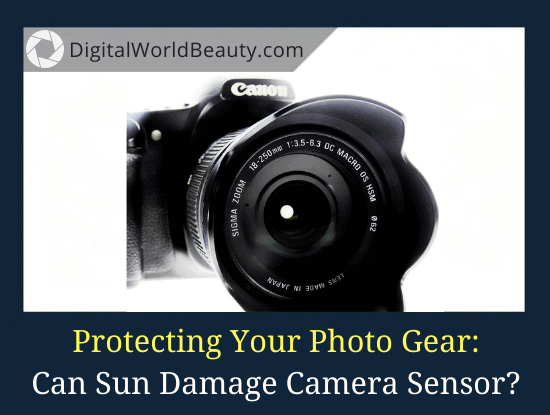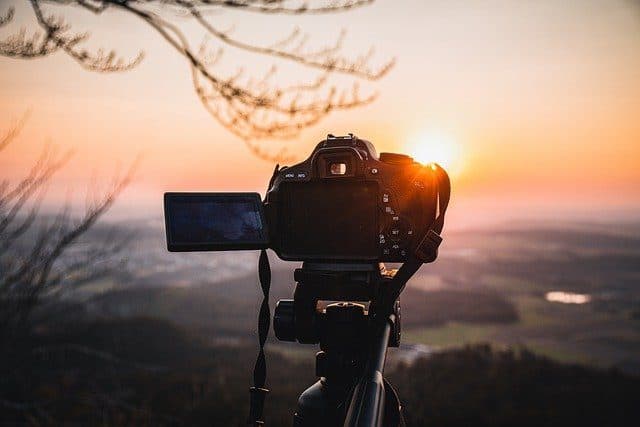Please note: As an Amazon Associate I earn from qualifying purchases. I also work with other affiliate partners and may be compensated from the links below. Details here.
Can the Sun Damage Your Camera Sensor? (Signs + Tips on How to Protect It)

Can the sun damage camera sensor? Signs + tips on how to protect it!
The thing is:
The sun has always been a fascinating subject among photographers. Since it is quite a difficult subject to focus on (in a more literal sense), not everyone gets to take a good shot of it.
Plus, there are also lots of dangers associated with pointing your camera directly towards the sun or viewing it through your OVF.
While shooting it in normal conditions quickly doesn’t pose much trouble for your gear, it’s a different story when you keep it exposed to this kind of bright light for too long. Chances are, your imaging sensors will suffer a lot.
So, if you’re pointing camera at sun, can the sun damage the camera sensor? How to tell if your camera sensor is damaged?
Read on to find out!
Can Sunlight Damage Camera Sensor?

Can bright light damage camera sensor?
It depends. There are several factors that would affect the degree of damage bright lights may cause. Let’s talk about each one in detail.
-
Exposure settings
Just like your eyes, your device also has parts that are extremely sensitive to light and heat and one particular example is the imaging sensor. This part is considered a really important part of the equipment, so it is imperative to protect it at all costs.
Actually, there is nothing wrong with taking a quick snap of the sunlight. A fraction of a second will not burn the insides of your gear. But if you expose it to direct sunlight for a long period of time, then that’s where the deterioration comes in.
The longer you point your gear to the sun without protection, the higher the chance of getting your sensors burned or damaged in the process. The duration of exposure allows for the sun’s heat to intensify and gives it more time to penetrate the various layers of materials in your camera. And this leads us to the next factor to consider.
-
The intensity of the light source
Now, imagine looking at the sun with your bare eyes. Wouldn’t that hurt even if you only looked at it for a few seconds? That also applies to cameras.
The sun’s energy is too strong especially during mid-day. If you’ve tried getting out during that time of the day, then you probably know how this heat easily burns the outermost layers of your skin (sunburns). With cameras, the intensity is even more magnified because of the lenses.
The glass acts as a magnifier of light, so in turn, it also creates more energy that is reflected towards the imaging sensor. With the energy from the sun focused on the small area inside the body, there is a really high chance of having your sensors damaged.
As in the case of DSLRs, though they have mirrors that reflect the light energy to the optical viewfinder (OVF), it still doesn’t mean you can point them directly towards the glaring sunlight. The heat will manifest on the OVF instead, making it more dangerous if you happen to look through it with your own eyes.
But why are there many beautiful photos of sunrise and sunsets when they can potentially damage the gear, you ask?
The thing is…
During those times of the day, sunlight isn’t that strong. It helps that it still lies low on the horizon so its energy focuses on the closest objects to it. There is still a lot of space in the atmosphere that can filter the energy coming from the light source.
That makes it really safe to take photos during those times of the day. But if you are still worried you might damage the device by doing so, make sure you use the correct filters to avoid it.
-
Settings
Your settings will also play a part in determining whether you can damage the camera by pointing it at the sun. As mentioned earlier, taking a quick snap of super bright light isn’t going to do damage to the device. But prolonged exposure certainly will.
Keeping the shutters open for long exposure shots is never advisable when taking direct photos of the sun. The reason for this is that the longer the shutter curtains are open, the more time the light source’s energy has to wreak havoc on the internals.
As heat builds up inside, the more damage it can do.
-
Angle/shot orientation
You also have to consider the composition of the shot for this matter. If you are taking a picture that happens to have the sun in the frame, then there’s nothing to worry about. But it is a different story if you intentionally point your device towards the glaring light rays.
If you’ve ever tried using a magnifying glass to focus a light source on a particular area, then that’s what you are also doing with your equipment. And the result? Damaged internals.
Signs of a Damaged Camera Sensor
Now…
How will you know if your sensors are damaged by too much light? How to tell if your camera sensor is damaged for real?
Here are some of the signs:
-
Visible multi-colored lines on the screen
If you see annoyingly visible multi-colored lines on your screen, the first thing you’ll probably think is that the LCD is damaged. Though this is true most of the time, the reason why it appears could also be because of a damaged internal (sensor).
Moreover, if you recently exposed your equipment to extremely bright light, then you can easily rule out that your screen is the problem.
-
Red spots captured on film
Red spots rarely appear on screen so this is a real sign of danger. Compared to the more common black spot appearances (which tells you that your sensor needs cleaning), red spots are signs that the “internals” of the device is deteriorating.
-
An obvious decrease in photo/video quality
Since its function is to detect and send information to your imaging processor on what your lens is seeing, then there is a high chance that a damaged sensor will reflect decreased video/photo quality. The reason for this is that it can no longer function properly, and the details picked up by the processor aren’t the same as before.
-
Too strong contrast
If you think you set the contrast properly but still find it a bit strong, then that could be a sign that the sensor is failing/deteriorating.
How to Protect Your Sensor from Sun Damage
The best way you can avoid damaging your camera’s guts is to avoid pointing it directly towards the sun, or other extremely bright light sources with high intensity.
But if you can’t avoid doing so, make sure you keep exposure minimal and quick so that it can’t penetrate the internal parts.
Also, if you are planning to take photos of it with long exposures, make sure to always use the appropriate filters to help block the energy transmitted through the lenses.
Now…
I’d like to hear from YOU:
What do you think, can taking pictures of the sun damage camera? How to tell if your camera sensor is damaged? Let us know your thoughts in the comments below!
This post was very informative to know about, especially when it comes to sunlight exposure. I never thought sunlight exposure to camera sensors may cause some damage if out for too long.
Is this for specific cameras, or all types of cameras?
I ask because I know someone who does photography for a living. His professional camera has had some problems when it’s out in direct sunlight.
So your research does validate some important points to keep in mind. I didn’t know much about it up until this point.
Thanks for sharing- a good article to read!
Hey Eric!
I’m glad you found this article informative.
As far as I know, long exposure to direct sunlight can damage camera sensors, regardless of type. In fact, many people think exposure to sunlight will not damage compacts because of their design, but the sun can still damage the sensors if you leave the shutter open for too long.
The thing is that the lenses of the cameras will act as magnifiers. They help intensify the light energy from the sun and then later transmits it to the sensor, leading to potential damage.
If you must really put the camera on long exposure settings, then I highly recommend using filters to avoid damaging the sensors. And even with those, you should still be careful with your gear because the protective layer can only do so much (unfortunately)!
Hope this helps, and thanks for your comment. 🙂
As I discovered birdwatching last year because of the global ‘rona situation, I’m using my camera more to get pictures of different birds. As I was looking for some photography tips, your article title got my attention, because when getting bird pictures, I need to raise the camera to the sky, and many times there’s direct sunlight. I never thought about the need to protect my camera and its lens from the potential sun damage. Oops. Thanks so much for sharing these tips.
Hi Alejandra, every day we learn something new! I’m glad you found this post useful, thanks for stopping by to leave a comment.
I was doing time lapse of the stars last night and I left the camera out until about 10 AM pointed south. The camera was off by then but my lens cap was off. Would this have done anything?
Hi Matt, I mean it wasn’t a direct sunlight straight to the sensor (like you weren’t pointing camera at sun on purpose), so I think it should be fine. But I’d try shooting and see if it does anything weird/unusual. Hope all is good with yours!